新目标人教版英语初三下册Unit 10 You’re supposed to shake hands Section B 2a-2e课件
人教版九年级英语《Unit 10 You’re supposed to shake hands. 》

人教版九年级英语《Unit 10 You’re supposed to shake hands. 》Section A_教学设计1一. 教材分析人教版九年级英语《Unit 10 You’re supposed to shake hands. 》Section A主要介绍了英语中不同场合下的礼貌用语和行为规范。
本节课主要围绕着日常交际用语展开,包括如何问候、介绍、道歉、道谢等。
教材通过丰富的情景对话和图片,帮助学生理解和掌握这些交际用语,提高他们的实际英语应用能力。
二. 学情分析九年级的学生已经具备了一定的英语基础,能够理解和运用一些基本的英语交际用语。
但是,他们在实际应用英语进行交际时,往往会因为害羞、自信心不足等原因而产生紧张和焦虑情绪,影响他们的交际能力。
因此,在教学过程中,需要注重培养学生的自信心,鼓励他们大胆开口说英语。
三. 教学目标1.知识目标:学生能够掌握本节课所学的日常交际用语,如问候、介绍、道歉、道谢等。
2.能力目标:学生能够在实际情景中运用所学的交际用语,提高他们的英语交际能力。
3.情感目标:通过本节课的学习,学生能够更加自信地使用英语进行交际,培养他们的跨文化交际意识。
四. 教学重难点1.重点:学生能够掌握并熟练运用日常交际用语。
2.难点:学生能够在实际情景中灵活运用所学的交际用语,并进行有效的交际。
五. 教学方法1.情境教学法:通过设置不同的情景,让学生在实际语境中学习和运用英语交际用语。
2.交际法:鼓励学生积极参与课堂交际活动,提高他们的英语交际能力。
3.任务型教学法:通过完成各种任务,让学生在实践中学习和运用所学的交际用语。
六. 教学准备1.教学课件:制作课件,包括文本、图片、音频等素材,以便于教学展示。
2.教学道具:准备一些日常交际用语相关的道具,如名片、礼物等,以便于课堂操练。
3.教学资源:收集一些关于日常交际用语的视频素材,用于课堂拓展。
七. 教学过程1.导入(5分钟)利用学生日常生活中的一些交际场景,如问候、介绍等,引导学生思考和讨论这些场景下应该如何用英语进行交际。
人教版新目标九年级英语Unit 10 You’re supposed to shake hands.的全单元教案
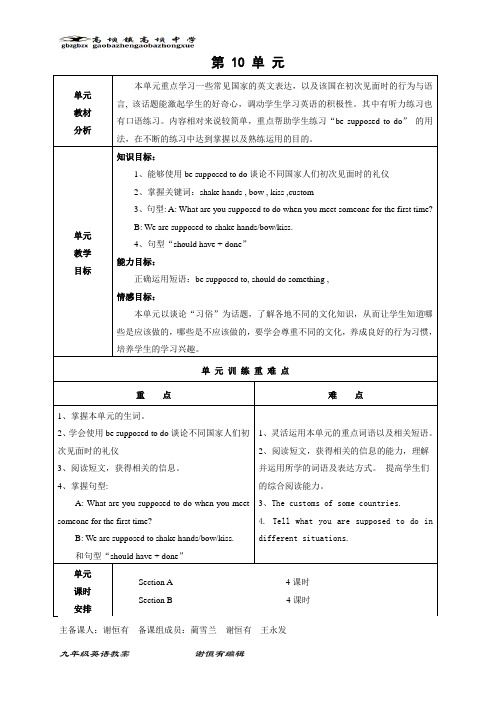
第 10 单元单元教材分析本单元重点学习一些常见国家的英文表达,以及该国在初次见面时的行为与语言, 该话题能激起学生的好奇心,调动学生学习英语的积极性。
其中有听力练习也有口语练习。
内容相对来说较简单,重点帮助学生练习“be supposed to do”的用法,在不断的练习中达到掌握以及熟练运用的目的。
单元教学目标知识目标:1、能够使用be supposed to do谈论不同国家人们初次见面时的礼仪2、掌握关键词:shake hands , bow , kiss ,custom3、句型: A: What are you supposed to do when you meet someone for the first time?B: We are supposed to shake hands/bow/kiss.4、句型“should have + done”能力目标:正确运用短语:be supposed to, should do something ,情感目标:本单元以谈论“习俗”为话题,了解各地不同的文化知识,从而让学生知道哪些是应该做的,哪些是不应该做的,要学会尊重不同的文化,养成良好的行为习惯,培养学生的学习兴趣。
单元训练重难点重点难点1、掌握本单元的生词。
2、学会使用be supposed to do谈论不同国家人们初次见面时的礼仪3、阅读短文,获得相关的信息。
4、掌握句型:A: What are you supposed to do when you meet someone for the first time?B: We are supposed to shake hands/bow/kiss.和句型“should have + done”1、灵活运用本单元的重点词语以及相关短语。
2、阅读短文,获得相关的信息的能力,理解并运用所学的词语及表达方式。
提高学生们的综合阅读能力。
英语人教版初中三年级下册 Unit_10_You‘re_supposed_to_shake_hand

In Japan
stick your chopsticks into your food
×
In Japan
point at anyone with your chopsticks
×
In the United States, you’re not supposed to eat with your hands.
友情提示:在被动语态中,此类结构中省略的动词不定式 to 要还原。 如:The boy was made to work twelve hours a day. 这个男 孩被迫每天干十二个小时的活。
友情提示:当宾语是不定式短语或从句时, 多用it作形式宾语。
:The heavy rain made it impossible for us to go out. 大雨使得我们无法出去。
不得不承认我发现记住一切东西是很困难的但我渐渐习惯了并且发现他们也不再那么奇怪了
Unit 10 You’re supposed to
shake hands.
Goals
To listen and talk about table manners.
To read about life as an exchange student.
• It’s bad manners to laugh at others. 嘲笑别人是不礼貌的.
manner 还可以表示 “风俗;习惯”, 也常以复数形式出现。 如:
The manners of the ancient Egyptians 古埃及的风俗习惯 manner 还可以表示 “方法;方式” “态度;举止”等意思。如:
The phone stopped ringing just as I picked up the receiver.
人教新目标英语九年级全册Unit 10 You’re supposed to shake hands

单选题—Have you read the book Jane Eyre?—Yes. It's a famous book and really worth ____.A. to readB. readingC. to be readD. read【答案】B【解析】句意:——你读过Jane Eyre这本书吗?——是的。
这是一本很有价值的书,值得一读。
考查动词形式辨析题。
be worth reading 值得一读。
根据句意结构,可知选B。
单选题You were ________ to close the windows.Why were you so careless? A. allowed B. believedC. supposedD. caused【答案】C【解析】句意:你应该关上窗户。
你为什么如此粗心?allow允许;believe相信;suppose假设;cause导致。
be supposed to应该,根据Why were you so careless?可知此处表示建议不应该如此粗心,因此应该关上窗户。
故选C。
单选题—Is it necessary us some photos before saving the old man?—Yes, it is. We can protect ourselves if we do so.A. of; takingB. for; takingC. of; to takeD. for; to take【答案】D【解析】句意“-对于我们来说,在救老人之前拍一些照片有必要吗?-有必要,如果我们这么做了,我们就能保护我们自己”。
根据it is adj for/of sb to do sth可知,第二空处用to take,排除A和B;若用for sb时,形容词修饰to do sth,若用of sb时,形容词修饰sb,表示某人的品质、性格等。
根据句意可知,necessary修饰to take some photos before saving the old man,用for,故选D。
人教新目标九年级全册 Unit 10 You,re supposed to shake hands

人教新目标九年级全册Unit 10 You,re supposed to shake hands SectionB(1a-1d)教案Unit10 SectionB(1a-1d)教案一、Teaching Aims:1. Language Goals:1) Words: greet, relaxed, value, drop by, capital, after all, noon, get mad, make an effort2) Sentences:A: What are you supposed to do when you meet someone for the first timeB: You are supposed to shake hands.S1: What are the other Chinese table mannersS2: We are supposed to eat after the old people.S3: We are not supposed to put elbows on the table.S4: We are not supposed to talk aloud at the dinner table.2. Ability Goals:Use “be supposed to do” to make sentences.3. Moral Goals:Help students know the different customs in different countries. Weshould know when in Rome, do as the Romans do.二、Teaching important Listening, speaking, reading, writing methods.五、Teaching ProceduresⅠ. Lead-in1. Watch a short movieT: Hello, everyone! We know different countries have different customs. But how do we display impeccable manners Let’s see a movie about how to behave good manners. How do you feel after watching the movie 2. After watching movie, Ss try to answer the questions.Ⅰ. Presentation1. See teaching objectsTo learn the table manners around the world.To read, listen and speak how you are supposed to behave at dinner tables in China.2. Students look at pictures and say different customs in different countries by using “be supposed to do” to make sentences.3. Ask students to turn to P77 to finish 1a and check the answers.4. Ask students about Chinese table manners:After seeing the pictures and say Chinese table manners.Summarize Chinese table manners.Ⅰ. Listening1. T: Steve is going to China to study. His friend Yang Ming is telling himabout table manners in China. Now listen and number the pictures in the order you hear them.2. Play the recording twice. Students number the pictures and match sentences parts.3. Play the recording again. Check the answers with the Ss.Ⅰ. Group workAsk student to make conversations.E.g.S1: What are the other Chinese table mannersS2: We are supposed to eat after the old people.S3: We are not supposed to put elbows on the table.S4: We are not supposed to talk aloud at the dinner table.Give students two minutes to make their conversations and perform their conversations.Ⅰ. Writing1. Ask students to summarize the phrases about Chinese table manners.2. Let some Ss read the information about writing and ask them to use sentence.3. Ss try to write a composition about Chinese table manners by using information in the chart. (Give students five minutes to write their compositions)4. Invite some students to read their compositions and check if there aremistakes.Ⅰ. SummaryAsk students to summarize the key phrases.Ⅰ. Homework:1. Find the differences about the table manners between France and China.2. Write a composition about Chinese table manners.。
人教版新目标英语九年级Unit10You’resupposedtoshakehands教案.doc
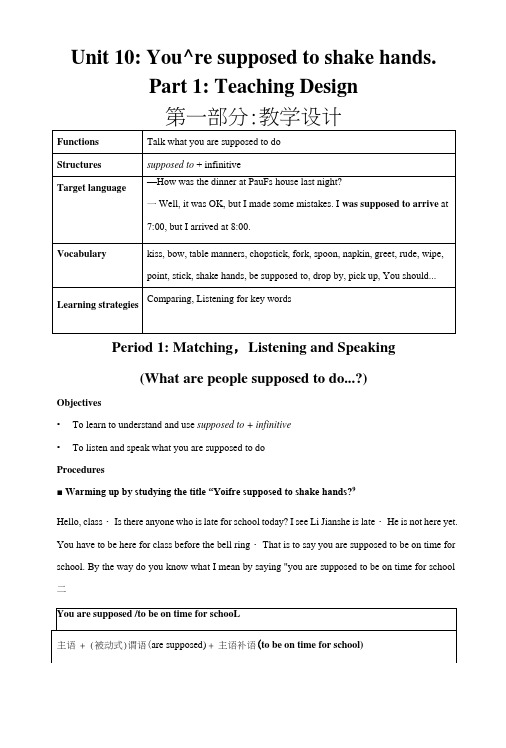
Unit 10: You^re supposed to shake hands.Part 1: Teaching Design第一部分:教学设计Period 1: Matching,Listening and Speaking(What are people supposed to do...?)Objectives•To learn to understand and use supposed to + infinitive•To listen and speak what you are supposed to doProcedures■ Warming up by studying the title “Yoifre supposed to shake hands?9Hello, class・ Is there anyone who is late for school today? I see Li Jianshe is late・ He is not here yet. You have to be here for class before the bell ring・ That is to say you are supposed to be on time for school. By the way do you know what I mean by saying "you are supposed to be on time for school 二be supposed to...其中to是动词不定式符号,不是介词,其后要跟动词原形。
当be supposed to...的主语是“人”时,意为“应该……”;“被期望……”,它可以用來表示劝告、建议、义务、责任等,相当于情态动词should。
如:Everyone is supposed to wear a seat-belt in the car.每个人在汽车里都应该系安全带。
人教版九年级英语《Unit 10 You’re supposed to shake hands. 》
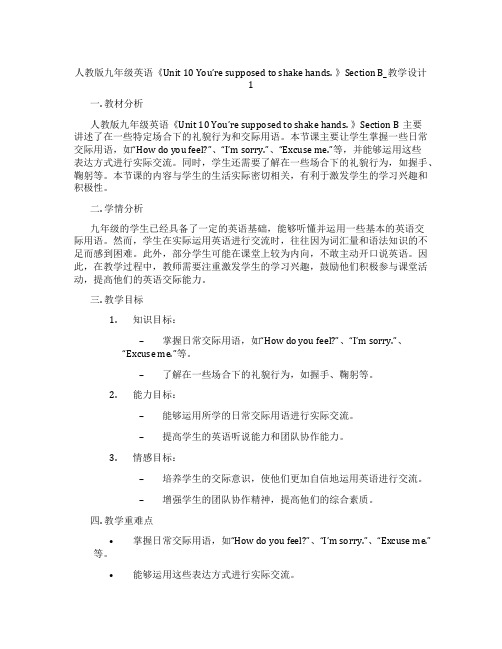
人教版九年级英语《Unit 10 You’re supposed to shake hands. 》Section B_教学设计1一. 教材分析人教版九年级英语《Unit 10 You’re supposed to shake hands. 》Section B主要讲述了在一些特定场合下的礼貌行为和交际用语。
本节课主要让学生掌握一些日常交际用语,如“How do you feel?”、“I’m sorry.”、“Excuse me.”等,并能够运用这些表达方式进行实际交流。
同时,学生还需要了解在一些场合下的礼貌行为,如握手、鞠躬等。
本节课的内容与学生的生活实际密切相关,有利于激发学生的学习兴趣和积极性。
二. 学情分析九年级的学生已经具备了一定的英语基础,能够听懂并运用一些基本的英语交际用语。
然而,学生在实际运用英语进行交流时,往往因为词汇量和语法知识的不足而感到困难。
此外,部分学生可能在课堂上较为内向,不敢主动开口说英语。
因此,在教学过程中,教师需要注重激发学生的学习兴趣,鼓励他们积极参与课堂活动,提高他们的英语交际能力。
三. 教学目标1.知识目标:–掌握日常交际用语,如“How do you feel?”、“I’m sorry.”、“Excuse me.”等。
–了解在一些场合下的礼貌行为,如握手、鞠躬等。
2.能力目标:–能够运用所学的日常交际用语进行实际交流。
–提高学生的英语听说能力和团队协作能力。
3.情感目标:–培养学生的交际意识,使他们更加自信地运用英语进行交流。
–增强学生的团队协作精神,提高他们的综合素质。
四. 教学重难点•掌握日常交际用语,如“How do you feel?”、“I’m sorry.”、“Excuse me.”等。
•能够运用这些表达方式进行实际交流。
•在实际交流中灵活运用所学的交际用语。
•了解并在实际场合中表现出相应的礼貌行为。
五. 教学方法1.任务型教学法:通过设置各种真实的交际任务,让学生在完成任务的过程中自然地学习和运用所学的交际用语。
人教新目标版英语九年级全一册《Unit 10 You’re supposed to shake ha

人教新目标版英语九年级全一册《Unit 10 You’re supposed to shake hands SectionB 3a-3b Self check》教学设计8一. 教材分析本课选自人教新目标版英语九年级全一册《Unit 10 You’re supposed to shake hands Section B 3a-3b Self check》。
本节课主要讲述了在不同的文化背景下,人们打招呼的方式不同。
本部分通过一个调查问卷的形式,让学生了解并比较不同国家的问候方式,培养学生的跨文化交际意识。
二. 学情分析九年级的学生已经掌握了基本的英语语法和词汇,具备一定的听说读写能力。
但是,对于一些特殊的交际场景和文化差异可能还不够了解。
因此,在教学过程中,教师需要帮助学生理解和掌握相关词汇和句型,并引导他们了解和尊重不同的文化背景。
三. 教学目标1.知识目标:学生能够掌握本课中的相关词汇和句型,并能够运用它们进行简单的交流。
2.能力目标:学生能够通过阅读和听力,理解不同文化背景下的问候方式,并能够进行相应的交流。
3.情感目标:学生能够尊重并理解不同的文化,培养跨文化交际的意识。
四. 教学重难点1.重点:学生能够掌握本课中的相关词汇和句型,并能够运用它们进行简单的交流。
2.难点:学生能够理解不同文化背景下的问候方式,并能够进行相应的交流。
五. 教学方法1.任务型教学法:通过设计各种任务,让学生在实践中学习和运用语言。
2.交际法:通过模拟真实的交际场景,让学生在交流中学习和提高。
3.文化导入法:通过介绍不同的文化背景,让学生了解和尊重不同的文化。
六. 教学准备1.教师准备:准备好相关的教学材料和课件,熟悉教材内容。
2.学生准备:学生预习本节课的内容,了解相关的词汇和句型。
七. 教学过程1.导入(5分钟)教师通过展示不同国家的问候方式的视频,引导学生谈论不同文化背景下的问候方式。
2.呈现(10分钟)教师呈现3a部分的调查问卷,让学生独立完成,并回答相关问题。
人教新目标九年级全册英语《Unit 10 You’re supposed to shake hands》课件

Travel around the World.
Brazil
the United States
Japan Mexico Korea
What are people in Brazil supposed to do when they meet for the first time?
} C: Nice to meet untries have different customs.
2a. Listen carefully and check the mistakes Maria made. Maria’s mistakes
Class rules
In our class ,We are supposed to _________________________________________ _________________________________________ _________________________________________ _________________________________________
2b
1. Maria was supposed to arrive at 7:00, but she _a_r_r_i_v_e_a_t_8_:_0_0___. 2. In Maria’s country, when you’re invited for 7:00, you’re expected to _c_o_m__e_l_a_te_r___. 3. When Maria met Paul’s mom, she was supposed to _sh__a_k_e_h_a_n_d_s_. 4. Maria should ask what she is supposed to ___w_e_a_r____ if she is invited to a party next time.
人教新目标九年级英语Unit 10 You re supposed to shake hands知识点汇总
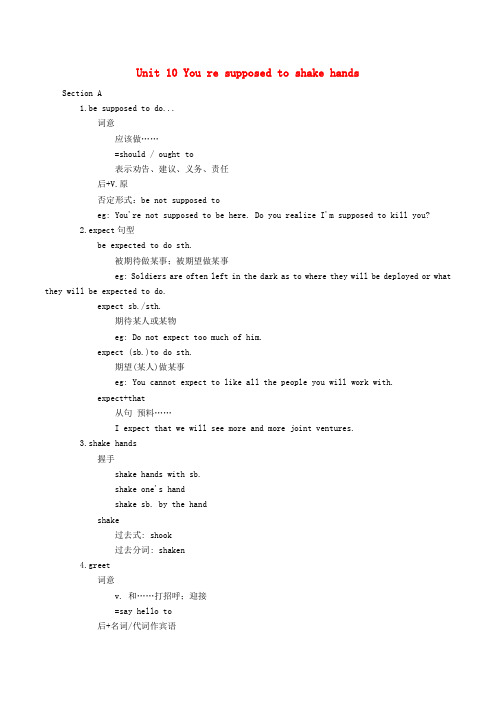
Unit 10 You re supposed to shake handsSection A1.be supposed to do...词意应该做……=should / ought to表示劝告、建议、义务、责任后+V.原否定形式:be not supposed toeg: You're not supposed to be here. Do you realize I'm supposed to kill you?2.expect句型be expected to do sth.被期待做某事;被期望做某事eg: Soldiers are often left in the dark as to where they will be deployed or what they will be expected to do.expect sb./sth.期待某人或某物eg: Do not expect too much of him.expect (sb.)to do sth.期望(某人)做某事eg: You cannot expect to like all the people you will work with.expect+that从句预料……I expect that we will see more and more joint ventures.3.shake hands握手shake hands with sb.shake one's handshake sb. by the handshake过去式: shook过去分词: shaken4.greet词意v. 和……打招呼;迎接=say hello to后+名词/代词作宾语5.mistaken.错误短语make a mistake / mistakes犯错误eg: I would have made a big mistake only you advised.by mistake错误地;由于差错make no mistake别搞错mistake forv. 把…错认为6.happen词意v. 发生eg. But how and when did it happen?不及物动词,不能用于被动语态辨析take place常指(某事)按计划进行或发生happen常指具体事件的发生,特别指那些偶然的或未能预见的事情的发生7.surpriseto one’s surprise词意:让某人吃惊的是in surprise词意:惊奇地8.relax辨析relaxv. 使放松relaxedadj. 主语通常是人relaxingadj. 主语通常是物9.value作及物动词词意:“重视;珍视”eg: I value friendship very highly.作名词词意:“价值”eg:Good books are of great value to students.10.drop by词意顺便访问;随便进入=come over to后可接表示地点的名词eg:Drop by often when you are free.11.after all词意:毕竟;终归all的相关短语1. first of all,意为“首先”,强调次序2. in all,意为“总共,总计”3. above all,意为“最重要的是,尤其是”,强调要引起特别注意12.effortn. 努力;尽力eg: All their efforts were in vain.effort的常用短语put more effort into sth.更加努力干某事make a good/every/an effort to do sth. 尽一切努力做某事without effort 毫不费力make an effort to do sth. 努力做某事13.keepkeep sb. doing sth.词意:让/使某人一直做某事结构:keep+宾语+宾语补足语eg: I keep them waiting at the gate.keep doing something词意:不断/ 反复/ 坚持做某事eg: He kept asking us to remember teamwork14.withoutprep. 无,没有反义词:with其后可接名词、代词;接动词时要用动词的-ing 形式eg: We got there without any trouble.15.It...句型It+be+adj.+to do sth.意为“做某事是……的”eg:I think it's important to sleep eight hours a night.It + be + adj. + for sb. + to do sth.对某人来说做某事是……的eg:It's hard for me to answer your question.It + be + adj. + of sb. + to do sth.某人做某事真是太……了eg:It was foolish of him to go alone.16. clean...off把……擦掉eg:Please clean the writing off the paper.与clean相关的短语:clean...down 把……清扫干净clean...out 把……的内部清扫干净clean up 清除干净17.knockv. 敲(门)n. 敲击声;敲击eg:There is a knock at the door.短语knock at/on敲knock against与……相撞knock down/off撞倒18.take off脱下(衣服)eg:It's very hot in the room. Take off your coat.(飞机等)起飞eg :The plane will take off in two hours.休假eg:I will take a few days off next week.19.worthadj.值得;有……价值(的)常用短语be worth doing值得做be well worth doing很值得做eg:The film Operation Red Sea is well worth seeing.be worth+钱值多少钱eg:The painting is worth 3,000 yuan.be worth+名词值得……eg:The newly opened museum is certainly worth a visit.20.mannern.方式;方法(pl.)礼貌;礼仪manners常以复数形式出现table manners 餐桌礼仪;have good manners有礼貌;have bad manners没有礼貌。
人教新目标英语初三全册Unit 10 You’re supposed to shake hands
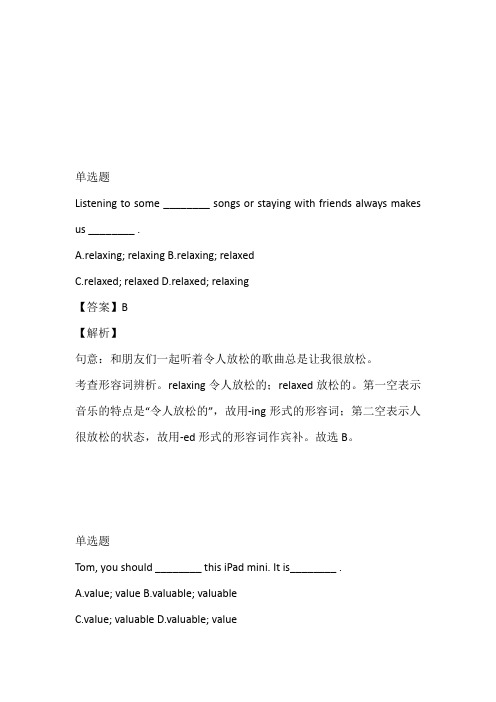
单选题Listening to some ________ songs or staying with friends always makes us ________ .A.relaxing; relaxingB.relaxing; relaxedC.relaxed; relaxedD.relaxed; relaxing【答案】B【解析】句意:和朋友们一起听着令人放松的歌曲总是让我很放松。
考查形容词辨析。
relaxing令人放松的;relaxed放松的。
第一空表示音乐的特点是“令人放松的”,故用-ing形式的形容词;第二空表示人很放松的状态,故用-ed形式的形容词作宾补。
故选B。
单选题Tom, you should ________ this iPad mini. It is________ .A.value; valueB.valuable; valuableC.value; valuableD.valuable; value【答案】C【解析】句意:汤姆,你应该珍惜这个新iPad mini,这很贵的。
本题考查动词和形容词词义辨析。
value可以做动词,意为“珍惜,爱惜”。
valuable为形容词,可做表语和定语,意为“有价值的”。
第一空缺动词,且should后用动词原形;第二空缺表语。
故选C。
单选题— I want to________ my friends’ home this afternoon. Would you mind my________ back a little late?—Not at all. Just go ahead.A.drop by; comeB.dropped in; comingC.drop by; comingD.dropped at; come【答案】C【解析】句意:——今天下午我想要顺便拜访我朋友的家。
你介意我晚点回来吗?——不介意,去吧。
考查动词短语以及动词用法。
人教新目标九年级英语下册教案设计:Unit 10 You’re supposed to shake
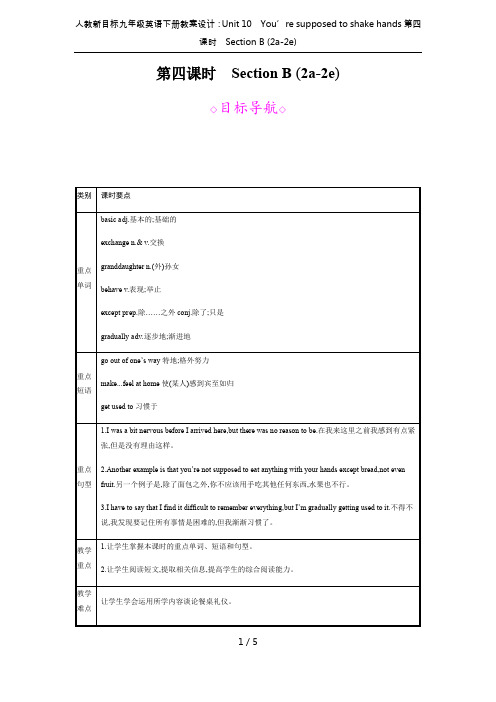
第四课时Section B (2a-2e)◇目标导航◇◇教学过程◇一、方法指导1.预习Page 78~79上的生词,根据音标能读出这些词,并掌握其词性及汉语意思。
2.朗读2b中的文章,试着翻译成汉语。
二、预习检测Ⅰ.英汉互译1.go out of one’s way特地;格外努力2.犯错误make mistakes3.make...feel at home使(某人)感到宾至如归4.切碎cut up5.get used to习惯于Ⅱ.根据句意用所给词的适当形式填空1.Do you feel comfortable living(live) in Beijing recently?2.Doctor Black is used to getting(get) up early.3.Table manners(manner) are different from country to country.4.I understood my teacher’s meaning gradually(gradual).5.Jack’s behavio(u)r(behave) was very bad.His mother was angry with him.Ⅲ.单项填空(A)1.What you said made me sad.A.feelB.feelsC.feelingD.to feel(B)2.He went out of his way some flowers for his mother.A.buyingB.to buyC.to buyingD.buy(D)3.Her mother is used to a rest after lunch.A.hasB.haveC.hadD.having(B)4.I cut the orange and ate it with a fork.A.downB.upC.intoD.out(A)5.You can have any of the hamburgers this big one.It is for our parents.A.exceptB.forC.besidesD.besideStep1Leading in1.Greet the class.2.Show some pictures about French customs and then ask the students to answer the questions: Have you ever eaten French food?What can you learn about the information from the pictures?Step2Work on2aAsk the students to answer the following questions:What do you know about customs in foreign countries?What do you think is the biggest challenge when visiting a foreign country?Step3Work on2b1.Ask the students what they know about the table manners in France.2.Ask the students to read the letter in 2b and answer the four questions.Then check the answers.3.Ask the students to read again and find the sentences which support the main idea.Step4Work on2c1.Tell the students that they have to learn to guess the meanings of the words they don’t know when they read the sentences.Make sure the students know what to do.2.Let the students read the sentences again and replace the underlined words with the phrases in the box.3.Check the answers with the whole class.Step5Work on2d1.Make the students review the passage and make notes about French customs in the chart.2.Ask a few students to give their answers.Step6Work on2e1.Ask the students to compare the table manners in France and in China in groups.2.Choose one group to talk about the differences and the similarities.◇教学反思◇本课时为阅读课,学生先思考2a中的问题,做好读前准备。
人教版 九年级英语 下册 Unit_10_You're_supposed_to_shake2
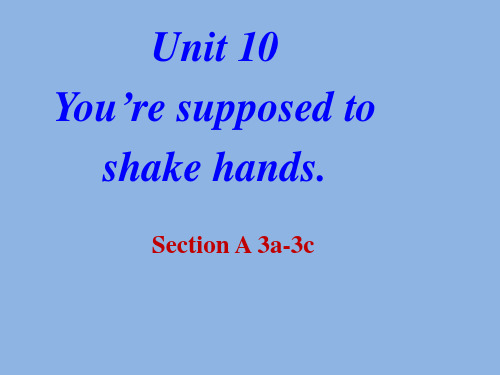
Section A-3a
中考题型专练
Answer the questions according to the passages in 3a.
• 1. Is it OK if people in Colombia arrive a bit late
for a friend’s dinner?
Yes, it is.
• 2. Who are pretty relaxed about time, Colombians or Swiss people? Colombians.
• 3. Colombians usually make plans to meet friends,
don’t they ?
No, they aren’t.
• 4. What are you supposed to do if you want to
visit your friends in Switzerland?
I am supposed to make plans.
• 5. What do people in Switzerland think of time?
5 Japan
A: What are people in …supposed to do when they
meet for the first time?
B: They are supposed to … A: What/How about in…? B: They’re expected t Brazil
the United States 4
pretty even almost
relaxed important impolite
rush mind arrive enjoy plan spend invite expect avoid call
人教新目标九年级英语下册教案设计:Unit 10 You’re supposed to shake

第三课时Section B (1a-1d)◇目标导航◇◇教学过程◇一、方法指导1.朗读1a和1c中的句子,找出重点句型。
2.浏览1c中的句子,预测听力所涉及的话题和内容。
3.与搭档交流讨论世界各地的餐桌礼仪。
二、预习检测Ⅰ.单项填空(A)1.is boring to listen to a same song again and again.A.ItB.ThatC.ThisD.They(B)2.It’s impolite to others with your chopsticks.A.point toB.point atC.point outD.point with(C)3.In Brazil,you should wipe(擦) your mouth your napkin(纸巾) every time you take a drink.A.forB.onC.withD.in(D)4.The bowl is full of water.Will you please it?A.makeB.changeC.takeD.emptyⅡ.按要求完成句子,每空一词1.It’s important for us to spend time with family and friends.(改为同义句)To spend time with family and friends is important to us.2.Would you drop by when you are in town?(改为同义句)Would you mind dropping by when you are in town?3.You are supposed to be there at 6:00.(对画线部分提问)When am I supposed to be there?4.Parents should let their children know some good manners.(改为同义句)Parents are supposed/expected to let their children know some good manners.5.What are you supposed to do?Do you know?(合并为一句)Do you know what you are supposed to do?Step1Leading in1.Greet the class.2.Show some pictures about table manners and then let the students discuss the table manners they know.Step2Work on1a1.Ask the students to read the quiz in 1a and then circle T or F after each sentence.2.Check the answers.Step3Work on1b-1c1.Ask the students to describe the three pictures in 1b.2.Ask the students to listen and number the pictures in the order that Yang Ming talked about in1b.3.Ask the students to listen again and match the sentence parts in 1c.4.Check the answers.Step4Work on1d1.Let the students discuss the table manners in their hometown in pairs.2.Ask the students to role-play a conversation about the table manners in their hometown.A:We’re supposed to...B:Yes,and it’s impolite to...◇教学反思◇本课时在Section A的基础上对礼仪习俗进行拓展,主要介绍了不同国家的餐桌礼仪。
人教新目标九年级英语下册教案设计:Unit 10 You’re supposed to shake

第五课时Section B (3a-Self Check)◇目标导航◇◇教学过程◇一、方法指导1.预习Page 79~80上3a和3b中的内容。
2.预习并试做Self Check中的题目。
二、预习检测Ⅰ.根据句意及汉语提示完成单词1.Does your school do an exchange(交流) with a school in London?2.The nurse said to me,“Don’t be nervous.Just stay relaxed(放松的).”3.It is difficult to get used to another country’s customs(风俗).4.I will give you some suggestions(建议).I’m sure they will be useful.Ⅱ.根据汉语意思完成句子,每空一词1.你应该找份兼职,多赚点钱。
You are supposed/expected to find a part-time job to make more money.2.无论你做什么,保持一个平和的心态是很重要的。
Whatever you do,it’s very important to keep a peaceful mind.3.我会努力擦干净所有的窗户。
I will make an effort to clean up all the windows.4.他如此生我们的气,以至于他会为了获得比赛胜利而更加努力。
He is so mad at us that he’ll try harder to win.5.我们在伦敦期间,他们设法让我们感到宾至如归。
They made their way to make us feel at home when we were in London.Step1Leading in1.Greet the class.2.Ask the students to discuss the different customs in different countries in groups.Step2Work on3a1.Let the students read the instructions and the chart in 3a.2.Ask the students to think of Chinese customs and fill in the chart in 3a in English.3.Choose some students to talk about their answers.Step3Work on3b1.Read the instructions.Show the letter with blanks on the board.Read the letter and get the students to use the information in 3a to finish the letter.2.Ask some students to share their letters.3.Introduce some writing skills.Step4Work on Self Check1.Finish Self Check 1(1)Let some students read the words in the box.Make sure all the students know the meaning of the words.(2)Let the students read the sentences in Self Check 1,and then try to fill in the blanks with the words in the box.(3)Let some students read their answers.Check the answers with the class.2.Finish Self Check 2(1)Tell the students that they have to complete the statements below.They should write sentences about the customs with “be (not) supposed/expected to/it’s polite/impolite to”.(2)Let the students think and try to complete the statements by themselves.(3)Let some students read their sentences to the class.(4)Correct the mistakes they make.◇教学反思◇本课时是一个模仿性写作训练板块,让学生在听、说、读的基础上,尝试有条理地输出语言。
- 1、下载文档前请自行甄别文档内容的完整性,平台不提供额外的编辑、内容补充、找答案等附加服务。
- 2、"仅部分预览"的文档,不可在线预览部分如存在完整性等问题,可反馈申请退款(可完整预览的文档不适用该条件!)。
- 3、如文档侵犯您的权益,请联系客服反馈,我们会尽快为您处理(人工客服工作时间:9:00-18:30)。
the cDharot.s
Don’ts
You’re expected You’re not supposed
to put your
to put your bread on
You’re expected to
bcuret uapdyoonurtfhrueit and
Yaynooyuut’hrrienpnglowat tisetuh.pypoousredhatondesat
Yes, she does.
This can be seen in the way she talks about her host family: that they are nice and they go out of their way to make her feel at home; that the grandmother make Chinese food for her; that the granddaughter is kind and talks to her in French to give her practice.
Language.
Traffic rules.
Eating habits.
Table manners.
课堂学习
2a
What do you know about customs in foreign countries? What do you think is the biggest
challenge when visiting a foreign country?
get/be used 习惯于(做)to后接名词、
to (doing) 某事
代词或v.-
sth.
ing形式
used to do 过去常常做 to后接动词
sth.
某事 原形,只用
于过去时
be used to 被用于做某 是被动语态,
我妈妈习惯早起 My mother is used to getting up early.
4. Lin Yue has slowly learned
● went out of their way
● be comfortable (doing)
● gradually gotten used to being
● (something) worry (someone)
2d Review the passage and make notes about
UNIT 10 You’re supposed to shake hands.
Section B(2a—2e)
第4课时
课堂导入
Have you ever been abroad? What do you think is the biggest challenge when visiting a foreign country?
topic sentence
topic sentence
2b Read the letter and answer the
questions.
1. Why is Li Yue in FShraenisceo?n a student exchange program.
2. Does she enjoy staying with her host family? How do you know?
从某一范围内排除出去,即except后的内容不包 除了含汤在姆内外。,上周日我们都去博物馆了。 We all went to the museum last Sunday
except Tom. 拓展:besides意为“除……之外(还有)”。表示
除了某人或某物外,还有其他人或物,即 besides后的内容包含在内。 除了汤姆外,上周日我和托尼也去博物馆了 。
我过去常常开车上班,但现在我习惯于骑 自行车。 I used to driving to work, but now I get used to riding my bike. 木头被用来建房子。 Wood is used to build houses.
课堂达标
I.用括号中所给词的适当形式填空
1. They go out of their wpearyfotor_m_______
1. I was a bit nervous before I arrived here, but there was no reason to be.
There is/was no reason (for sb.) to do sth.意 为“(某人)
我没们有没理有由理做由某迟事到”。。 There is no reason for us to
Tony and I went to the museum last Sunday
besides Tom.
4. I have to say that I find it difficult
to remember everything,
bu(t1)I’“mfindgrita+daudja.+lltyo dgoesttthi.n”g为u固s定ed结t构o ,意
In France, people cut the fruit up and eat it with a fork. But in China, we …
In France, people don’t put their elbows on the table. But in China, we …
课文关键信 息
My student exchange program in France
Life in my host family
My biggest challenge
grandmother: learned how to make Chinese food
granddaughter: help me practice French
4. I have to say that I find it difficult
to remember everything,
bu(t2I)’辨m析g:ragedtu/baelulysedgetot(tdinoigngu) sstehd.,toused
it.
to do sth.与be used to do sth.
make me feel at home
You’re supposed to:
Put your bread on the table
Cut it up and eat it with a fork
Say ”That was delicious”
You’re not supposed to:
Put your bread on your plate.
behave v. 表现, except prep.
举elb止ow n. 肘,
除gra…d…ua之lly外adv. 逐渐
g胳et膊used to 习惯于 地
Read the letter quickly and find out the topic sentence
for each paragraph.
table.
Read the letter quickly and find out the new words and phrases.
exchange n. teenage adj. 十几 granddaughter n. 交go换out of one’s wa岁y的to do sth. 特地/格(外外努)孙女 力ma做ke某sb事. feel at home 使某人感到 宾至如归
他们想方设法为全体乘客服务。 They go out of their way to serve all the passengers. 她格外努力地学习英语。 She goes out of her way to study English.
2. They go out of their way to
teaabt litew. ith a fork. except bread.
You’re not supposed to
You’re expected to say you’re full.
say “That was
delicious” if you You’re not supposed to
don’t want any
be late. 我没有理由做那件事。 There is no reason for me to
do that.
2. They go out of their way to mak(e1)mgoeoufteoeflonaet’shwoamy 意e为. “特地;格外
努力”,后跟to do sth.。
mak(e2)mmaekfeeseb.lfaeetl ahtohmomee意. 为“使某人感到
宾至如归”。 他的善良使我感到宾至如归。
His kindness makes me feel at home.
3. Another example is that you’re not
supposed to eat anything with your hand eexxcec人pet或p作t某介b物词re,ad意,为n“ot除e…ve…n之fr外u”it。. 表示把某
(perform) welwl. atc
2. My father usteadkhitno ________ (watch) TV
Eat anything with your hands except bread
Say you’re full
Put your elbows on the table
